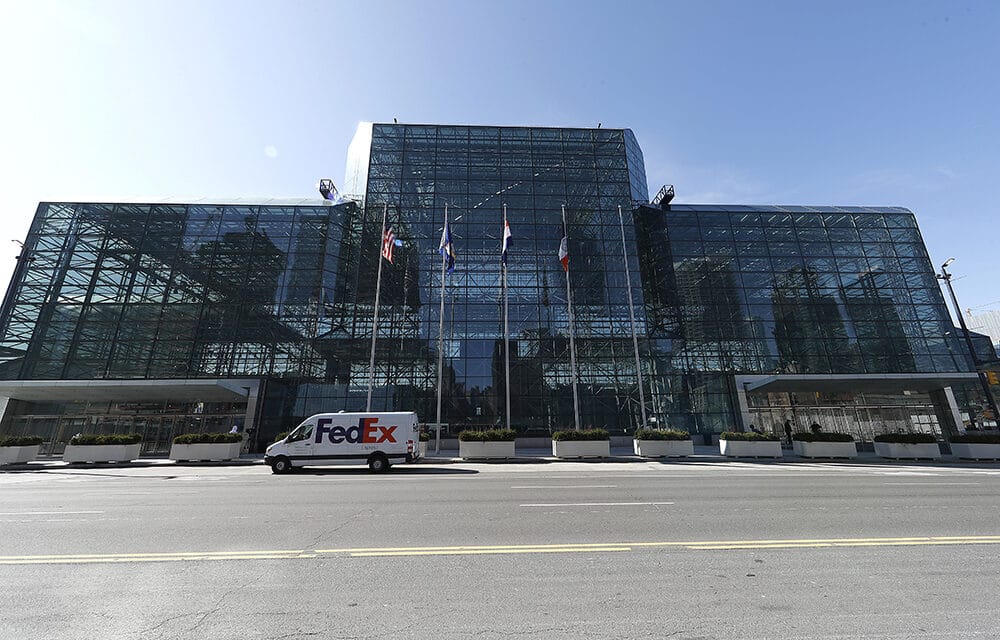BE AWARE: Building Intelligence created a program with the Javits Center in New York City during the convention center’s recent expansion. (Getty Images)
Building Intelligence’s cloud-based software helps keep venues safe at the front entrance as well as the loading dock
Tightening up safety and security can be a conundrum for large venues with many moving parts — specifically visitors, vehicles, vendors and freight.
New York City-based Building Intelligence has set out to help buildings manage and coordinate those components, upping the ante on protection with a cloud-based software solution geared for stadiums, arenas, convention centers and other commercial and event centers. Covering vehicles, vendors and visitors, the three software modules digitally transform the process of engagement, entry and exit by monitoring visitors and vendors as they enter on foot through the front door or in a vehicle at the loading dock or parking area.
“This software enables these facilities to partner with vendors coming on site through a scheduling mechanism that allows for proper documentation and driver’s registration,” said Building Intelligence Chief Operating Officer Chris Lipowicz. “These programs create frictionless access to obtain visitor recognition quicker with safety top of mind.”
The software as a service program has been put into use at a number of venues, including New York City’s Yankee Stadium and Jacob K. Javits Convention Center and Washington, D.C.’s Capital One Arena.
Recently implemented, the Javits Center’s core vehicle platform allows for scheduling and pre-vetting of vehicles.
“We worked with the convention center on creating a program in concert with the facility’s expansion,” Lipowicz said. “Javits was dealing with a four-story, multi-unit project that included a vehicle staging area. It needed a frictionless entry point for show setup and breakdown for 300 events throughout the year.”
Building Intelligence integrated the convention center’s 31 recognition cameras, along with weight scales, to identify freight moving in for just-in-time recognition.
“Workflow associated with whether or not a vehicle should be allowed into or next to stadiums, convention centers and other high-risk buildings should be common practice,” said Building Intelligence CEO Jeffrey Friedman. “What most buildings’ security staff do is take a clipboard and write down what they see, which is reporting, but this is not a thorough (vetting) process. In addition, many times, there is a third party using the building, so there’s no chance for an event manager to know the necessary information to help with security. Guards typically make decisions (on who has access to certain areas) based on how someone looks, and we’re upgrading that.”
Building Intelligence’s SV3 software suite provides real-time freight control by managing a third-party network of vendors
 and contractors. Users can schedule freight elevators before arrival and assign docks and bays. Security is tightened at the loading dock, stadium, campus and warehouse by creating a workflow that allows vendors to be verified and authorized before coming onto the site. Venues also can verify arriving vehicles against a list of approved tickets and manage vendors from any device with the program’s online portal. In addition, delivery scheduling can be restricted based on time or delivery size. Watchlists of vendors and drivers not permitted on the site can be created to restrict access.
and contractors. Users can schedule freight elevators before arrival and assign docks and bays. Security is tightened at the loading dock, stadium, campus and warehouse by creating a workflow that allows vendors to be verified and authorized before coming onto the site. Venues also can verify arriving vehicles against a list of approved tickets and manage vendors from any device with the program’s online portal. In addition, delivery scheduling can be restricted based on time or delivery size. Watchlists of vendors and drivers not permitted on the site can be created to restrict access.
Building Intelligence’s SV3 Visitor module manages the scheduling, authorization and access of all people entering a facility. With this program, use of an integrated QR code expedites visitor processing. The program incorporates into a venue’s physical access control system, which allows badges or mobile QR codes to go directly to turnstiles, elevators or rooms.
The company’s other two modules, the SV3 Vehicle and Vendor software programs, further enhance logistics and streamline operations to allocate for peak hours, reduce waste and increase revenue. The program’s Operation Insights feature provides real-time data into a venue’s daily activities, vehicle and pedestrian traffic.
All three SV3 programs have received SAFETY Act certification, which is the highest level of accreditation awarded by the U.S. Department of Homeland Security for anti-terrorism technologies.
The software was initially launched in 2014 at the loading dock of New York City’s Time Warner Center.
“We took that product and showed it to other building managers, including Hudson Yards in Manhattan,” Friedman said. “People said it’d be great for use at stadiums to manage information and run checkpoints.”
The web-based solution is typically used through mobile devices like smartphones and iPads using Wi-Fi or 5G networks.
“The goal is to safely allow vehicles, vendors and visitors to come into secure areas and build a trusted access program while creating more protected areas,” Friedman said. “It’s important to make sure trucks going underneath or next to a venue belong there. With our program, the vendor has to register both the vehicle and driver and someone schedules time for the vehicle to make a delivery.”
“The venue side is a large focus of ours.”
— CHRIS LIPOWICZ
Building Intelligence also offers a mobile app, SV3GO, which allows tenant users to schedule visitors and send them a QR code for a quick, touchless check-in process. When a delivery location has been assigned, users instantly receive push notifications. Drivers also can use the app to upload delivery documents like material handling or bill of lading.
“Clients can interconnect our program with license plate reader cameras, weight scales or underground systems,” Friedman said. “It’s about having a lot of layers, and this can be a central hub to gather intelligence on recognition data coming from separate silos. The program brings it all together to verify the information and report on it.”
Through the use of SV3, intelligence is built over time to effectively manage whether a visitor, vehicle or vendor is allowed on site. Necessary documents can be uploaded, which security guards can scan using their cellphones, and back-of-house visitors can be more easily vetted.
“With this software, stadiums and arenas also can see when VIPs or rides arrive, and coaches can be notified when a team bus enters the building,” Friedman said. “We offer a healthy logistical practice and efficiency to help buildings operate at maximum efficiency.”
Users of Building Intelligence software pay a monthly fee and are billed by the number of entry points. The basic program includes three visitor entrances, with the price scaling up from there. “If there are a lot of bays, there is more traffic, and more services are required,” Friedman said.
The company recently expanded its offerings to address the challenges presented by COVID-19 by acquiring Veristream, a visitor management company. Orlando, Florida-based Veristream launched its first visitor management software, iVisitor, in 2008. The multi-tenant, cloud-based visitor management system oversees visitors and contractors while incorporating security requirements. Created for health, safety and compliance, it includes a visitor destination and capacity tracker feature as well as visitor and employee check-in capabilities.
“This was an exciting opportunity for us to not only add a well-tenured product and team to our staff but also to build out some inroads into an outstanding customer base so we can come to market with a more fully stacked product set,” Lipowicz said. “It’s not a contraction but an acquisition with expansion velocity that gives us global perspective into 1,150 sites and over 350 customers.”
More than 1,000 locations worldwide, including offices, commercial buildings, stadiums and event centers, are using Building Intelligence and Veristream platforms to improve security and operations.
“Veristream’s product is purely visitor management (that can be combined with the Building Intelligence program), which is a solution to solve vehicle traffic, congestion, security, information and communication,” Friedman said. “Much is going on with loading docks on game day in baseball stadiums and football arenas with so many games and events. It became like catering halls where not everyone knows what’s going on. Our software manages information as it comes in.”
Friedman added that, because one size does not fit all, and a city stadium has different needs than one located in the suburbs, the software can be modified to fit a venue’s needs.
“Building Intelligence has dedicated its focus on large venues, such as convention centers, arenas and stadiums, as we move to the end of this year to next year,” he said. “Our software is the first to market of its kind and best in class from a credibility standpoint. It is positioned to help open the chasm and expand products on the vehicle management side. And the venue side is a large focus of ours, with the success our product has had in the marketplace.”







